- Home
- Gayle Forman
Just One Day jod-1 Page 21
Just One Day jod-1 Read online
Page 21
I make a new list.
Airfare to Paris: $1200
French class at community college: $400
Spending money for two weeks in Europe: $1000.
All together that’s $2,600. That’s how much money I’ll need to save to get to Europe. Mom and Dad are not helping with the trip, obviously, and they’re refusing to let me use any of the money in my savings account, from gifts through the years, because that’s supposed to be for educational purposes, and they’re the trustees on the account, so I can’t argue. Besides, it’s only through Grandma’s intervention, coupled with my threat to go live at Dee’s for the summer that Mom has even agreed to let me live at home. She’s that mad. She’s that mad without even knowing the entire story. I told them I went to Paris. I didn’t tell them why. Or with whom. Or why I need to go back, except that I left something important there—they think it’s the suitcase.
I’m not sure what infuriates her more. Last summer’s deceit or the fact that I won’t tell her everything about it. She refused to speak to me after the Seder and then four weeks went by with barely a word from her. Now that I’m back home for the start of the summer she basically avoids me. Which is both a relief and also kind of scary, because she’s never done anything like this before.
Dee says that twenty-six hundred dollars is a lot for two months, but not impossible. He suggests skipping the French class. But I feel like I need to do that. I’ve always wanted to learn French. And I’m not going back to Paris—not facing down Céline—without it.
So, twenty-six hundred bucks. Doable. If I get a job. But the thing is, I’ve never had a job before. Nothing remotely job-like, beyond babysitting and filing at Dad’s office, which hardly fills the spiffy new résumé that I’ve printed on beautiful card stock. Maybe this explains why, after dropping it off at every business in town with a job opening, I get zero response.
I decide to sell my clock collection. I take them to an antique dealer in Philadelphia. He offers me five hundred bucks for the lot. I’ve easily spent double that on the clocks over the years, but he just looks at me and says that maybe I’ll do better on eBay. But that would take months, and I just want to be rid of them. So I hand over the clocks, except for a Betty Boop one, which I send to Dee.
When Mom finds out what I’ve done, she shakes her head with such profound disgust, like I have just sold my body, not my clocks. The disapproval intensifies. It wafts through the house like a radiation cloud. Nowhere is safe to hide.
I have to get a job. Not just to earn the money but to get out of this house. Escaping to Melanie’s isn’t an option. Number one, we’re not speaking, and number two, she’s at a music program in Maine for the first half of summer—this according to my dad.
“You just gotta keep trying,�� Dee advises when I call him for job advice from our landline. As part of my punishment, my cell phone has been turned off, and the family Internet password protected, so I have to ask them to log me onto the web or else go to the library. “Drop your résumé at every business in town, not just the ones saying they’re hiring, ’cause usually places that are desperate enough to hire someone like you don’t have time to advertise.”
“Thanks a lot.”
“You want a job? Swallow your pride. And drop off a résumé everywhere.”
“Even the car wash?” I joke.
“Yeah. Even the car wash.” Dee isn’t kidding. “And ask to speak to the manager of the car wash and treat him like the King of All Car Washes.”
I imagine myself scrubbing hubcaps. But then I think of Dee, working in a pillow factory this summer or hosing off dishes in the dining hall. He does what he has to do. So the next day, I print out fifty new résumés and just go door to door, from bookstore to sewing shop to grocery store, CPA firm to the liquor store to, yes, the car wash. I don’t just drop my résumé. I ask to speak to managers. Sometimes the managers come out. They ask me about my experience. They ask me how long I want to be employed for. I listen to my own answers: No real job experience to speak of. Two months. I get why nobody’s hiring me.
I’m almost out of résumés when I pass by Café Finlay. It’s a small restaurant on the edge of town, all done up in 1950s décor, with black-and-white-checked floors and a mishmash of Formica tables. Every other time I’ve gone past, it seemed to be closed.
But today music is blasting from inside so loud the windows are vibrating. I push the door, and it nudges open. I shout “hello.” No one replies. The chairs are all stacked up on the tables. There’s a pile of fresh linens on one of the booths. Yesterday’s specials are scrawled on a chalkboard on the wall. Things like halibut with an orange tequila jalapeño beurre blanc with kiwi fruit. Mom calls the food here “eclectic,” her code for weird, which is why we’ve never eaten here. I don’t know anyone who eats here.
“You here with the bread?”
I spin around. There’s a woman, Amazon tall and just as broad, with wild red hair poking out from under a blue bandanna.
“No,” I say.
“Motherfucker!” She shakes her head. “What do you want?” I hold out a résumé. She waves it away. “Ever work in a kitchen?” I shake my head.
“Sorry. No,” she says.
She looks at the Marilyn Monroe wall clock. “I’m going to kill you, Jonas!” She shakes her fist at the door.
I turn to leave, but then I stop. “What’s the bread order?” I ask. “I’ll run and get it for you.”
She glances at the clock again and sighs dramatically. “Grimaldi’s. I need eighteen French baguettes, six loaves of the Harvest. And a couple of day-old brioche. You got that?”
“I think so.”
“Think so’s not gonna butter the bread, honey.”
“Eighteen baguettes. Six loaves of Harvest and a couple of day-old brioche.”
“Make sure it’s stale brioche. Can’t make bread pudding with fresh bread. And ask for Jonas. Tell him it’s for Babs and tell him he can throw in the brioche for free and knock twenty percent off the rest because his damn delivery guy was a no-show again. Also, make sure I don’t get any sourdough. I hate that shit.”
She grabs a wad of cash from the vintage register. I take it from her and sprint to the bakery as fast as I can, get Jonas, bark the order, and run back with it, which is harder than it sounds, carrying thirty loaves of bread.
I pant as Babs looks over the bread order. “You know how to wash dishes?”
I nod. That much I can do.
She shakes her head in resignation. “Go to the back and ask Nathaniel to introduce you to Hobart.”
“Hobart?”
“Yep. You two’ll be getting intimate.”
Hobart turns out to be the name of the industrial dish washer, and once the restaurant opens, I spend hours with it, rinsing dishes with a giant hose, loading them in Hobart, unloading them while they’re still scalding hot and repeating the whole enterprise. By some miracle, I manage to stay on top of the never-ending flow of dishes and not drop anything or burn my fingers too badly. When there’s a lull, Babs orders me to cut bread or whip cream by hand (she insists it tastes better that way) or mop the floor or find the tenderloins from one of the walk-in coolers. I spend the night in an adrenaline panic, thinking I’m about to screw up.
Nathaniel, the prep cook, helps me as much as he can, telling me where things are, helping me scrub sauté pans when I get too slammed. “Just wait till the weekend,” he warns.
“I thought no one ever ate here.” I put my hand over my mouth, instinctually knowing Babs would be mad to hear that.
But Nathaniel just laughs. “Are you kidding? Babs is worshipped by the Philadelphia foodies. They make the trek out here just for her. She’d make way more money if she moved to Philly, but she says her dogs would hate it in the city. And by dogs, I think she means us.”
When the last of the diners leave, the kitchen staff and the waiters seem to all exhale at once. Someone blasts some old Rolling Stones. A bunch of tables are pushed together a
nd everyone sits down. It’s well past midnight, and I have a long walk home. I start to pack up my things, but Nathaniel motions for me to join them. I sit at the table, feeling shy even though I’ve been bumping hips with these people all night.
“You want a beer?” he asks. “We have to pay for them, but only cost.”
“Or you can have some of the reject wine the distributors bring by,” a waitress named Gillian says.
“I’ll take some wine.”
“It looks like someone died on you,” says one of the waiters. I look down. My nice skirt and top—my good job- hunting outfit—are covered in sauces that look vaguely like bodily fluids.
“I feel like I’m the one who died,” I say. I don’t think I’ve ever been this tired. My muscles ache. My hands are red from the near-scalding water. And my feet? Don’t get me started.
Gillian laughs. “Spoken like a true kitchen slave.”
Babs appears with the big bowls of steaming pasta and small chunks of leftover fish and steak. My stomach lets out a gurgle. The platters get passed around. I don’t know if her cooking is “eclectic,” but the food is amazing, the orange tequila jalapeño sauce is only faintly orange, and it’s smoky rather than spicy. I clear my plate, and then sop up any remaining sauce with a hunk of Jonas’s not-sourdough bread.
“So?” Babs asks me when I’ve finished.
All eyes turn to me. “It’s the second best meal I’ve ever had,” I say. Which is the truth.
Everyone else oohs, like I’ve just insulted Babs. But she just smirks. “I’ll bet your first best was with a lover,” she says, and I go as red as her hair.
Babs instructs me to return the next day at five, and the routine starts all over again. I work harder than I ever have, eat an amazing meal, and pour myself into bed. I have no idea if I’m filling in for someone or maybe being auditioned. Babs screams at me constantly, for using soap on her cast-iron sauté pan or not getting the lipstick off the coffee cups before they go into Hobart or making the whipped cream too stiff or not stiff enough or not adding the exact right amount of vanilla extract. But by the fourth night, I’m learning not to take it so personally.
On the fifth night, before the dinner rush, Babs calls me to the back near the walk-in refrigerator. She’s sucking on a bottle of vodka, which is what she does before the rush begins. Her lipstick leaves smudges on the rim. For a second, I think this is it, that she’s going to fire me. But instead she hands me a sheaf of documents.
“Tax forms,” she explains. “I pay minimum wage, but you’ll get tips. Which reminds me. You keep forgetting to collect yours.” She reaches under the counter for an envelope with my name on it.
I open up the envelope. There’s a wad of cash in there. Easily a hundred dollars. “This is mine?”
She nods. “We pool tips. Everyone gets a cut.”
I run my fingers over the money. The bills snag on my ragged hangnails. My hands are beyond thrashed, but I don’t care because they’re thrashed from my job. Which has earned me this money. I feel something well up inside me that has nothing to do with airplane tickets or Paris trips or money at all, really.
“It’ll go up in the fall,” Babs says. “Summer’s our slow season.”
I hesitate. “That’s great. Except I won’t be here in the fall.”
She wrinkles her red brows. “But I just broke you in.”
I feel bad, guilty, but it was right there on my résumé, the first line—Objective: To obtain short-term employment. Of course, Babs never read my résumé.
“I go to college,” I explain.
“We’ll work around your schedule. Gillian’s a student too. And Nathaniel, on and off.”
“In Boston.”
“Oh.” She pauses. “Oh, well. I think Gordon’s coming back after Labor Day.”
“I’m hoping to leave by the end of July. But only if I can save two thousand dollars by then.” And as I say it, I do the math. More than a hundred bucks a week in tips, plus wages—I actually might be able to pull it off.
“Saving for a car?” she asks absentmindedly. She takes another swig of her vodka. “You can buy mine. That beast’ll be the death of me.” Babs drives an ancient Thunderbird.
“No. I’m saving for Paris.”
She puts her bottle down. “Paris?”
I nod.
“What’s in Paris?”
I look at her. I think of him for the first time in a while. In the craziness of the kitchen, he became a little abstract. “Answers.”
She shakes her head with such vehemence her auburn curls come loose from her bandanna. “You can’t go to Paris looking for answers. You have to go looking for questions—or, at the very least, macarons.”
“Macaroons? The coconut things?” I think of the gross cookie replacements we eat on Passover.
“Not macaroons. Macarons. They’re meringue cookies in pastel colors. They are edible angel’s kisses.” She looks at me. “You need two thousand bucks by when?”
“August.”
She narrows her eyes at me. They’re always a little bit bloodshot, though, oddly, more so at the beginning of a shift than at the end, when they take on a sort of manic gleam. “I’ll make you a deal. If you don’t mind working some doubles for weekend brunch, I’ll make sure you earn your two grand by July twenty-fifth, which is when I close the restaurant for two weeks for my summer vacation. On one condition.”
“Which is?”
“Every day in Paris, you eat a macaron. They have to be fresh, so no buying a pack and eating one a day.” She stops and closes her eyes. “I ate my first macaron in Paris on my honeymoon. I’m divorced now, but some loves are enduring. Especially if they happen in Paris.”
A tiny chill prickles up my neck. “Do you really believe that?” I ask her.
She takes a slug of vodka, her eyes glinting knowingly. “Ahh, it’s those kind of answers you’re after. Well, I can’t help you with that, but if you hustle into the walk-in and find the buttermilk and the cream, I can give you the answer to the proverbial question of how to make the perfect crème fraîche.”
Twenty-seven
JUNE
Home
Intro to French runs three days a week for six weeks, from eleven thirty to one, giving me yet another reason to be out of the House of Disapproval. Though I’m at Café Finlay five nights a week these days, and all day on weekends, on weekdays, I still don’t go in until five. And the restaurant is closed on Monday and Tuesday, so there’s a lot of dead time for Mom and me to avoid each other in.
On the first day of class, I arrive a half hour early and grab an iced tea from the little kiosk and find the classroom and start looking through my book. There’s lots of pictures of France, many from Paris.
The other students start to filter in. I expected college kids, but everyone except me is my parents’ age. One woman with frosted blond hair plops down at the desk next to mine and introduces herself as Carol and offers me a piece of gum. I gladly accept her handshake but decline the gum—it doesn’t seem very French to chew gum in class.
A birdlike woman with cropped gray hair strides in. She looks like she stepped out of a magazine in her tight linen pencil skirt and little silk blouse, both perfectly pressed, which seems impossible, given the ninety percent humidity outside. Plus, she’s wearing a scarf, also strange, given the ninety percent humidity.
Clearly, she is French. And if the scarf wasn’t a giveaway, then there’s the fact that she marches up to the front of the room and starts speaking. In French.
“Are we in the wrong class?” Carol whispers. Then the teacher goes to the board and writes her name, Madame Lambert, and the name of the class, Intro to French. She also writes it in French. “Oh, no such luck,” Carol says.
Madame Lambert turns to us and in the thickest accent imaginable tells us in English that this is beginning French, but that the best way to learn French is to speak and hear it. And that is about the only English I hear for the next hour and a half.
> “Je m’appelle Thérèse Lambert,” she says, making it sound like this: Teh-rez. Lomb-behr. “Comment vous appelez-vous?”
The class stares at her. She repeats the question, gesturing to herself, then pointing to us. Still no one answers. She rolls her eyes and does this clicking with her teeth. She points to me. Clicks again, gestures for me to stand up. “Je m’appelle Thérèse Lambert,” she repeats, enunciating slowly and tapping her chest. “Comment t’appelles-tu?”
I stand there for a second frozen, feeling like it’s Céline again jabbering away at me disdainfully. Madame Lambert repeats the question. I get that she’s asking me my name. But I don’t speak French. If I did, I wouldn’t be here. In Intro to French.
But she’s just waiting now. She’s not letting me sit down.
“Je m’appelle Allyson?” I try.
She beams, as though I’ve just explained the origins of the French Revolution, in French. “Bravo! Enchantée, Allyson.”
And she goes around the class asking everyone else’s name the same way.
That was round one. Then comes round two: “Pourquoi voulez-vous apprendre le français?”
She repeats the question, writing it down on the board, circling certain words and writing their English translations. Pourquoi: why. Apprendre: learn. Voulez-vous: do you want. Oh, I see. She’s asking why we want to learn French.
I have no clue how to begin to answer that. That’s why I’m here.
But then she continues.
“Je veux apprendre le français parce que . . .” She circles Je veux: I want. Parce que: because. She repeats it three times. Then points to us.
“I can do this one. I know this word from the movie,” Carol whispers. She raises her hand. “Je veux apprendre le français parce que,” she stumbles over the words and her accent is awful, but Madame just watches her expectantly. “Parce que le divorce!”
“Excellent,” Madame Lambert says, only she says it in the French way, which makes it sound even more excellent. Le divorce, she writes on the board. “Divorce. La même,” she says. The same, she writes. Then she writes down le mariage and explains that this is the antonym.

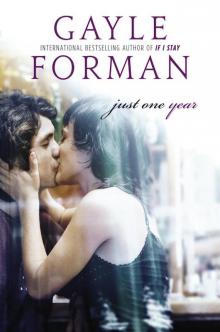 Just One Year
Just One Year If I Stay
If I Stay Where She Went
Where She Went Sisters in Sanity
Sisters in Sanity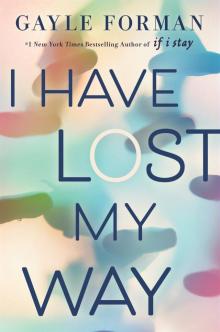 I Have Lost My Way
I Have Lost My Way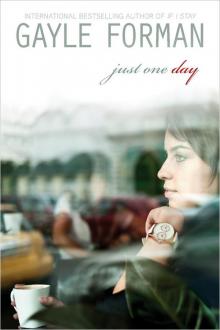 Just One Day
Just One Day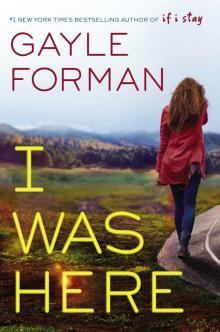 I Was Here
I Was Here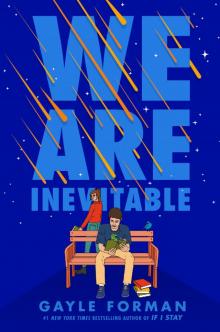 We Are Inevitable
We Are Inevitable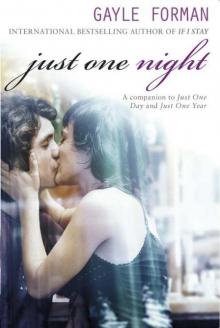 Just One Night
Just One Night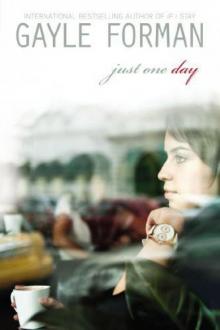 Just One Day jod-1
Just One Day jod-1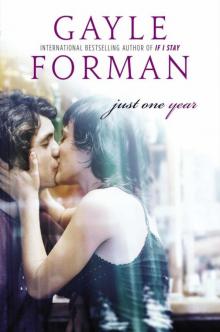 Just One Day 02: Just One Year
Just One Day 02: Just One Year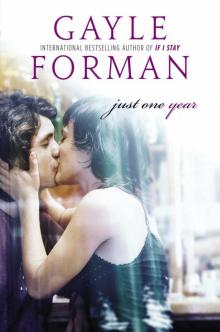 Just One Year jod-2
Just One Year jod-2